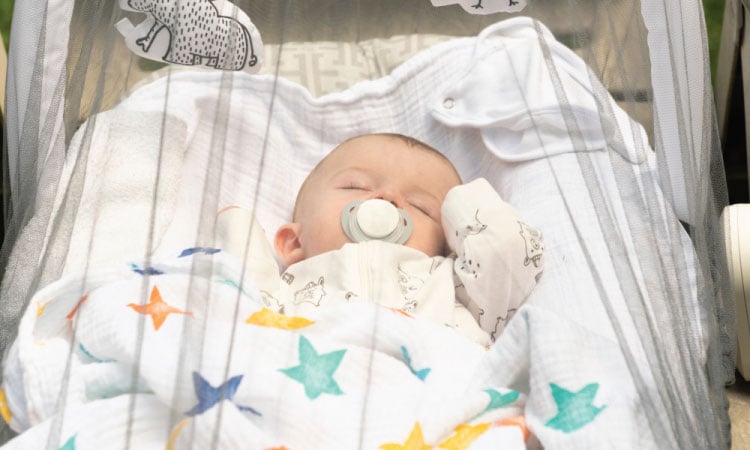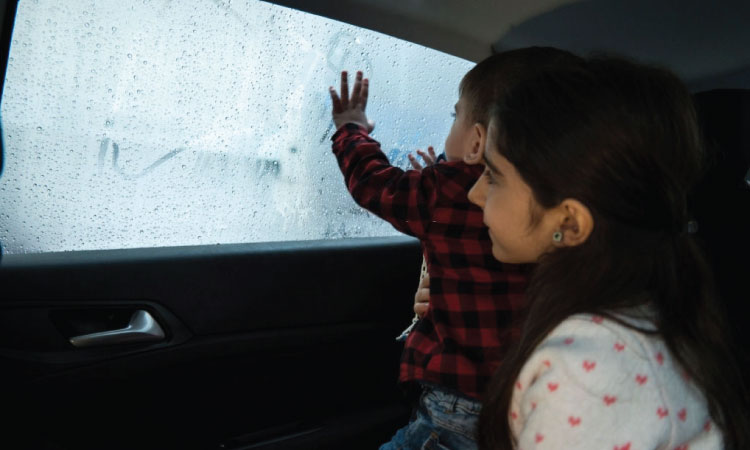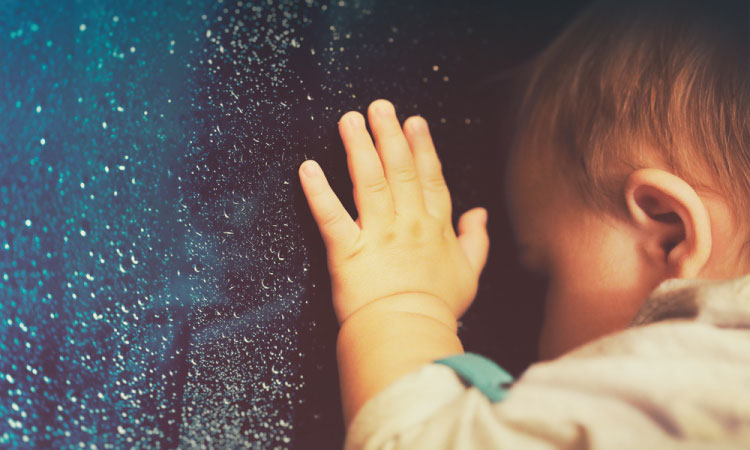After a long, scorching summer, rain is a treat for both our body and mind. It is no secret that we all eagerly await the advent of the monsoon. However, this season also demands extra care for babies as it holds many unpleasant surprises for them. Parents often search for baby care tips for monsoons to keep them happy and comfortable. Whether you use these tips at home or when you head out, monsoons do call for attention towards a few things.
Does Rainy Weather Affect Babies?
This moist and humid weather is a breeding ground for disease-causing fungus, bacteria, and viruses. Insects like mosquitoes that can potentially bring about many dangerous health issues like malaria also thrive during monsoon. Following specific hygiene guidelines can help to prevent many of these illnesses in our children. This article provides top baby care tips for monsoon that will help you rise to the situation and ace baby care in monsoon.
As we know, babies have underdeveloped immune system. Therefore any sudden changes in the climate can badly affect them. Their body can’t adjust to sudden changes. The rainy season comes with a sudden drop in temperature and a rise in humidity.
Therefore, babies are at a risk of a plethora of health risks during the rainy season. The risk factors that can bring about serious health risks in babies will be both indoor and outdoor.
During the rainy season, babies are susceptible to:
- Common cold and flu
- Water-borne diseases like cholera, typhoid, dysentery, a stomach infection, and diarrhoea
- Viral infections like viral fever, pneumonia, cold, and cough
- Diseases from mosquitoes like dengue, chikungunya, and malaria
- Worm infestation due to contamination of food
- Skin rashes due to fungal infections
10 Baby Care Tips For Monsoons
With the monsoons setting in, mothers must be vigilant to keep the baby healthy and happy throughout the season. When it comes to baby care in the rainy season, both indoor and outdoor precautions matter.
1. Ensure a mosquito-free environment

Monsoon is the breeding season for mosquitoes and the time of widespread mosquito-borne diseases. Many mosquito-borne diseases can have a long-term effect on babies. Some diseases even affect the brain development of babies. Therefore it is important to ensure a mosquito-free environment for babies. For this,
- Make sure you never let water collect and stagnate in and around your home. Remember the mosquito can breed even in little water. So make sure there is no stagnant water in bathrooms, balcony, air cooler, and garden
- Occasional spraying of disinfectant and fogging will also help to stop the breeding of mosquitoes, but you have to keep the child away from home when doing this
- Apply light lavender oils in the exposed parts of the baby’s skin when you take the baby outdoor during the rainy season
- You can also use baby safe mosquito repellent patches which you can place in the baby’s cloth (not directly to the skin)
- It is during the evening time the mosquitoes often swarm towards the house. Attaching physical barriers like mosquito screens on doors and windows will effectively mosquito-proof your home
- If you’re in an area that has a really intense insect infestation (for example, close to a water body like a lake, pond, or river) you should install insect screens on bedroom windows and doors opening outwards
Related Reading: 9 Homemade Natural Mosquito Repellents For Babies
2. Keep your baby clean
The first and foremost point, when it comes to taking care of babies during monsoon is to keep them clean and dry. For this:
- Give the baby a sponge bath: During the rainy season, there is no need for a daily bath. Instead of a bath, you can sponge bath the baby with a warm towel. In case you are in humid places, the baby may sweat a lot. In that case, you can give the baby warm preferably during noontime. Always examine the skin folds and joints of the baby for any signs of wetness or itching
- Oil massage: There’s no harm in using baby massage oil during monsoons. Choose the oil that suits the sensitive skin of the baby and the weather
- Give special care to the private parts of the baby: A baby’s private parts must be thoroughly cleaned and dried after each diaper change or after every time the baby goes to the toilet. If using diapers, ensure frequent changes and cleaning even if it is not soiled. Never use talcum powder in the private area of babies. Also, make it a point to give some diaper-free time for your little one
- Regularly trim your baby’s nails: Rashes and itching can be exacerbated by humid conditions. Keep your baby’s nails clipped to avoid getting scratched. Bacteria may also breed under the nails, thereby, increases the risk of skin infections. Therefore, keep your baby’s and your own nails trimmed on a regular basis
3. Keep home clean
Just like taking measures to avoid the breeding of mosquitoes, it is important to avoid molds and fungus inside your home. Make sure there are no leaks or dampness in the walls or roof. It is important to mop the floor every day with disinfectant.
Related Reading: 18 Baby Proofing Ideas To Ensure There Are No Accidents
Avoid wet shoes inside the house by all means. For this, make sure the shoe rack is placed on the porch and all the members should be very particular to remove their footwear and clean their feet before entering the house.
4. All members of the house should follow hygiene rules
One of the biggest germ carriers, not surprisingly, is your hands. And, the people who can pass on the infection to the baby are family members and caregivers. Therefore all the members of the family must wash their hands thoroughly and rub sanitizer in their hands before handling the baby or when they come from outside. It is a good habit to sanitise/wash your hands before touching the baby- inculcate this from the beginning.
5. Tips to dress baby during monsoons

Baby care in monsoons is incomplete without a few tips on dressing the baby. Since the temperature fluctuates during monsoon, babies should be dressed accordingly. For this;
- Never over-dress baby. If the temperature is fluctuating you can dress your baby in layers especially when you go out
- Make the baby wear clothes made of soft cotton fabric. You can go for clothes made of thick cotton which while being comfortable and breathable will keep your baby warm too
- Steer clear of synthetic clothing that can contribute to rashes
- Opting for full sleeves may help to shield the baby from insect bites
- Change baby’s diaper or cloth nappies frequently during monsoon days. A wet diaper can be a breeding ground for harmful bacteria. Also, give the baby extra air time by letting the baby go diaper-free for as much time as possible
Related Reading: 7 Tips to Choose Clothes For Premature Babies
6. Baby feeding during the rainy season
There is no need to change the baby feeding schedule during the rainy season. When it comes to breastfeeding a baby, breastmilk is the best nutrition as well as medicine you can offer your baby. Breastmilk not only keeps the baby well hydrated but also provides antibodies to enhance the immunity of the baby.
Breastfed babies are relatively on the safe side when it comes to the safety of food and water during monsoon. But when it comes to older babies and formula-fed babies, there are some precautionary measures that can be taken-
- For older babies always give freshly prepared semi-solids or solids
- Due to humidity, baby bottles and baby foods are more susceptible to the growth of mold during the rainy season. Furthermore, unanticipated power cuts during stormy weather can spoil stored food in the refrigerator
- Make sure feeding bottles are thoroughly sterilized in warm water or hot steam before feeding your baby
- Water-borne diseases increase during rainy season. Therefore, it is mandatory to boil the water thoroughly and bring it to optimum temperature before preparing the formula
- Never ever let the baby or toddler eat open street food during the rainy season is the most common cause of food-borne illness during monsoon
7. Tips for monsoon skincare for babies
Baby skincare during the rainy season is very important to keep the common skin issues at bay. Here are some monsoon skincare tips for babies:
- Use mild, gentle soap for bath. Opt baby soaps infused with herbs, olive oil, almond oil, coconut oil, or vitamin E for bathing baby
- Oil massage once a week helps to improve blood circulation
- Give baby a head bath at least twice a week during monsoon. You can opt for a gentle baby shampoo to wash your baby’s hair
- In case of mild rashes use a calamine-based lotion with natural ingredients
Related Reading: 13 Baby Hygiene Tips – From Head To Toe
8. Maintain pleasant room temperature
Baby care during monsoons is all about keeping the baby happy and comfortable. Like us adults, a baby too feels uncomfortable if the room temperature is not optimal. If you are using an air conditioner, set a temperature that is comfortable for the baby. In the case of a non-ac room, make sure there is airflow in the room by opening the windows and adjust the speed of the fan according to the baby’s comfort.
9. Keep medicines at home
As a rule, self-medication is not advised for a baby’s illness. But it is wise to consult with the baby’s doctor about basic medicines to store at home and their dosage. Cough, cold and fever are common health issues the baby contracts during the rainy season. If you wait to resolve the baby rash on its own, the issue may aggravate in no time.
Related Reading: Age Wise Home Remedies For Loose Motions In Babies
Therefore having an idea about home remedies to treat these common issues and storing some general medicines at home helps not to delay the treatment in case you are not able to take the child to the doctor due to some reasons.
10. Outdoor baby care tips for monsoons

Here are some steps to follow when you take the child out during the rainy season:
- Avoid large crowds: As your baby comes into contact with more people, his risk of catching an infection is increased. Stay away from crowded places with high volumes of people. Carry a hand sanitizer and anti-bacterial wipes at all times. Make it a practice of using it yourself before handling the baby in public places
- Avoid dirty areas: While taking your baby on a walk or a stroll, avoid dirty places with a lot of garbage or stagnant water. These places are a perfect breeding ground for infectious diseases
- Carry a small portable sanitizer: Make it a practice to carry a small sanitizer bottle in your handbag/pram/stroller. This way you can disinfect your hands anytime anywhere before handling your baby
- Protect the baby from mosquitoes: You should avoid taking your infant for walks at dusk as the number of mosquitoes will be extremely high during this time and the mosquitoes throng to the child. Also, dress your infant in full-sleeved clothes. You can spray natural mosquito repellent in your baby’s cloth and also carry it with you (as the effect of these sprays won’t last long). Also, lightly apply essential oils like lavender oil, eucalyptus oil, or peppermint oil to the exposed skin of the baby after diluting it
- Take vaccinations: Talk to the doctor about taking the flu vaccine for the baby as it helps to increase the immunity level of the baby even if exposed to infection during monsoon
Conclusion
The rainy season is one of the most beautiful seasons, so just because there are risks involved, you should not be afraid to enjoy it with your baby. You can enjoy nature during the rainy season with your baby by following the tips mentioned above.

